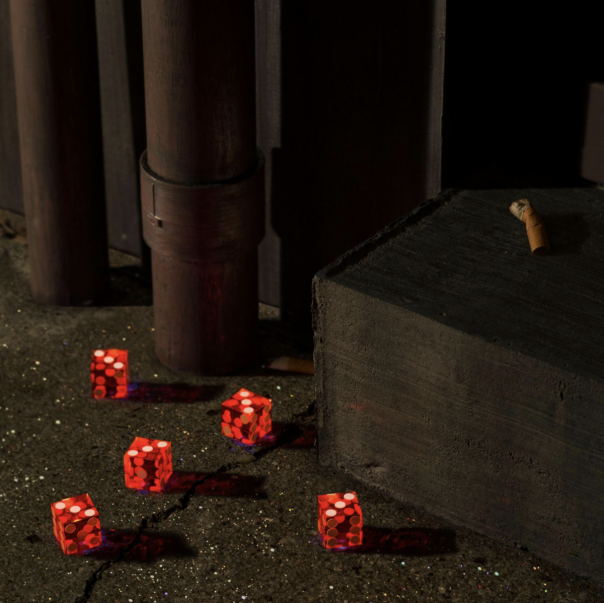ALBUM REVIEW: Bright Eyes get mysterious on ‘Five Dice, All Threes’

Bright Eyes, “Five Dice, All Threes.”
The first 90 seconds of Five Dice, All Threes, the new album from folk-rock act Bright Eyes, features dialog centered on a dice game called game of threes. It’s impossible to know whether the conversation was recorded for the album, is a dialog from a movie—there’s certainly a few seconds of the public domain’s “Steamboat Willie”—or was perhaps even recorded surreptitiously. The intended takeaway seems to be that life’s a gamble, and certainty is hard to find.
Five Dice, All Threes
Bright Eyes
Dead Oceans, Sept. 20
8/10
Get the album on Amazon Music.
The band’s first album since 2020’s Down In The Weeds, Where The World Once Was itself features a dynamic juxtaposition of cryptic hinting and heartfelt confession.
“I was cruel like a President/ It was wrong but I ordered it/ Lost some limbs in an accident/ Playing God,” Conor Oberst sings during the opening verse on the album, on “Bells and Whistles.”
And yet elsewhere, the song seems almost like an inside joke written among friends. “No, you shouldn’t go home with the SOHO girl/ ‘Cause she only wants materials/ And you shouldn’t place bets on the New York Mets/ ‘Cause at best it’s hypothetical,” the frontman and singer adds later.
Somewhere Bob Dylan is smiling.
The album moves between sparse, dramatic and stark arrangements, and much fuller and more elaborate instrumentations. Songs like “All Threes” and “Hate” begin simply with piano, drums and Oberst’s vocals. The galloping rhythm and strident vocals of “El Capitan” call to mind earlier Americana music like Arlo Guthrie. “Bas Jan Ader” adds a banjo into the mix, while Oberst offers one of his simpler personal disclosures, singing, “I never thought I’d see 45/ How is it that I’m still alive?”
“Spun Out” not only features a retinue of banjo, reverb-drenched guitar and piano, but switches things up with a hip-hop-inspired breakdown replete with record scratching and DJ tricks. Lyrically the song is novelistic in scope, reflecting on all manner of grim ends. “Out on the ledge/ The worst temptation/ The great summation ensues,” Oberst sings. After a viewpoint shift, later in the song, he adds, “I’m a kid with cancer/ I’m out to pasture.”
The emotional lynchpin of the album is extended piano ballad “Tiny Suicides.” The song features a long monologue delivered by Frank Sinatra in 1954 movie “Suddenly.” “Show me a guy with feelings, and I’ll show you a sucker,” Ol’ Blue Eyes intones over lush slide guitar and piano. The cognitive dissonance is off the charts.
The album’s first single, “Rainbow Overpass,” which features So So Glos vocalist and bassist Alex Levine (aka Alex Orange Drink), evolves from delicate acoustic guitar strumming into a galloping rock song, equal parts Bob Dylan and Weezer.”
“I’m so bored of these intrusive thoughts coming after me/ Sick of my own voice screaming right beneath my teeth/ That old familiar sound when my cellphone hits the ground/ When that thing just doesn’t sing, it’s just something I drag around,” Oberst intones.
As has already been hinted, Five Dice, All Threes, owes much of its aesthetic to Bob Dylan, to the Guthries before him, and to John Dowland way before that. Some of the juxtapositions resolve. The album’s emotional sensitivity serves as a refutation of Sinatra’s callous toxicity. The hip-hop influence of “Spun Out” offers new musical vistas beyond folk and Wilco-vibed dad rock.
Most importantly, Oberst’s relentless self-reflection, which finds its voice in both poetic hyperbole and frank admissions, provides both mystery and catharsis, and the underlying tension this creates fuels the band’s artistry.
